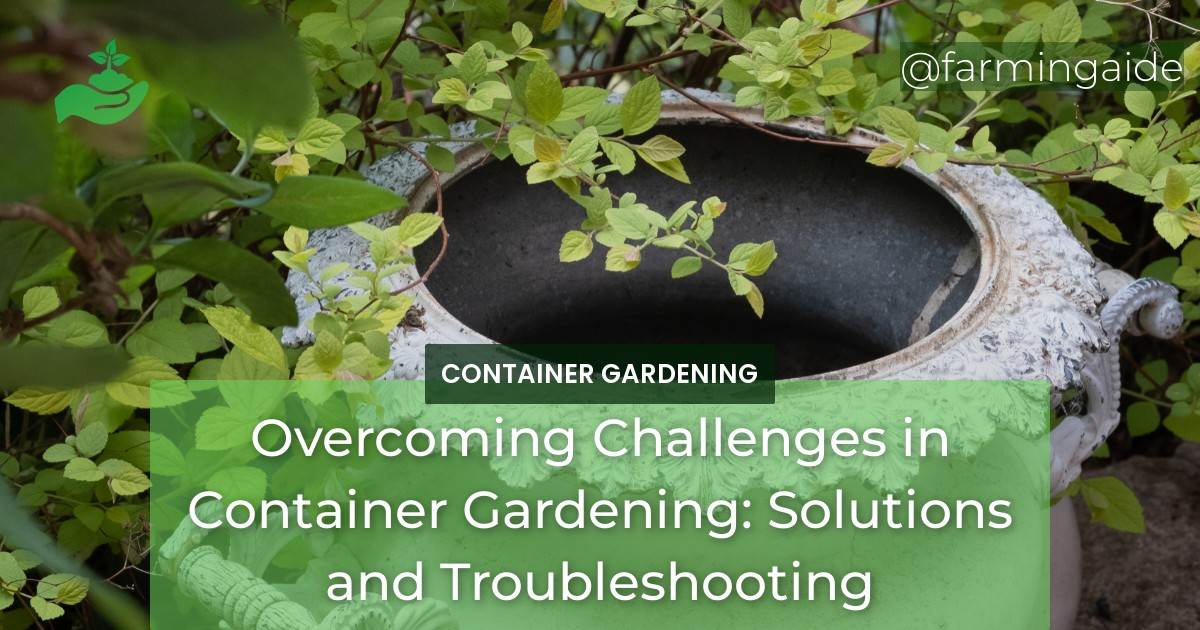Container gardening is a popular way to add greenery to small spaces or create a portable garden in rented spaces. It offers a lot of flexibility and allows for the cultivation of a wide range of plants in various environments. However, just like traditional gardening, it comes with its fair share of challenges.
In this article, we’ll explore some challenges in container gardening faced by container gardeners and provide solutions to overcome them.
Table of Contents
Choosing the Right Container
The first step in container gardening is selecting the right container. A container that is too small or too shallow will restrict root growth and limit the size of the plant. On the other hand, a container that is too large can hold too much water and lead to root rot. Consider the following when choosing the right container:
- Size: The container should be at least 1.5 times the size of the plant’s root ball.
- Drainage: Ensure that the container has drainage holes to prevent waterlogging.
- Material: The material of the container can affect the plant’s root temperature. Terracotta, for example, absorbs moisture and can dry out the soil, while plastic retains moisture.
Container Drainage
Proper drainage is crucial for container gardening as it prevents waterlogging and root rot. Here are some tips to ensure proper drainage:
- Container: Choose a container with drainage holes.
- Soil: Use a well-draining soil mix that is specifically formulated for container gardening.
- Gravel: Add a layer of gravel to the bottom of the container to aid drainage.
- Elevate: Elevate the container on bricks or blocks to allow excess water to drain away from the container.
ALSO READ
Plant Stress Management
Container plants are more susceptible to stress than plants grown in the ground due to their limited root space and exposure to environmental elements. Here are some ways to manage plant stress:
- Watering: Container plants require more frequent watering than plants grown in the ground. Be sure to water the plant when the top inch of soil is dry.
- Fertilizing: Use a slow-release fertilizer or a liquid fertilizer at half strength during the growing season.
- Protection: Shield the plant from harsh environmental elements such as wind and direct sunlight.
Troubleshooting Container Gardening
Despite your best efforts, problems may arise in your container garden. Here are some common problems and troubleshooting tips:
Problem: Yellowing leaves
Possible causes:
- Overwatering
- Poor drainage
- Nutrient deficiency
Solution:
- Reduce watering frequency
- Improve drainage
- Fertilize with a balanced fertilizer
Problem: Pests
Possible causes:
- Aphids, mites, and other insects
- Fungal and bacterial diseases
Solution:
- Use organic pesticides such as neem oil or insecticidal soap
- Remove infected plants or plant parts
Problem: Wilting or drooping
Possible causes:
- Underwatering
- Overwatering
- Root rot
Solution:
- Water the plant more frequently
- Allow the soil to dry out between watering
- Improve drainage
Can Container Gardening Challenges Affect the Overall Look of My Garden?
Yes, container gardening challenges can definitely affect the overall look of your garden. Ensuring a creating cohesive container garden look requires careful consideration of plant selection, color coordination, and maintenance. Overcoming challenges such as plant diseases, watering issues, and limited space will ultimately impact the visual harmony of your entire garden.
Conclusion
Container gardening can be a rewarding way to grow plants in small spaces or create a portable garden. However, it comes with its own set of challenges. By carefully selecting containers, ensuring proper drainage, managing plant stress, and troubleshooting common problems, you can overcome these challenges and enjoy a thriving container garden.
RELATED ARTICLES:


